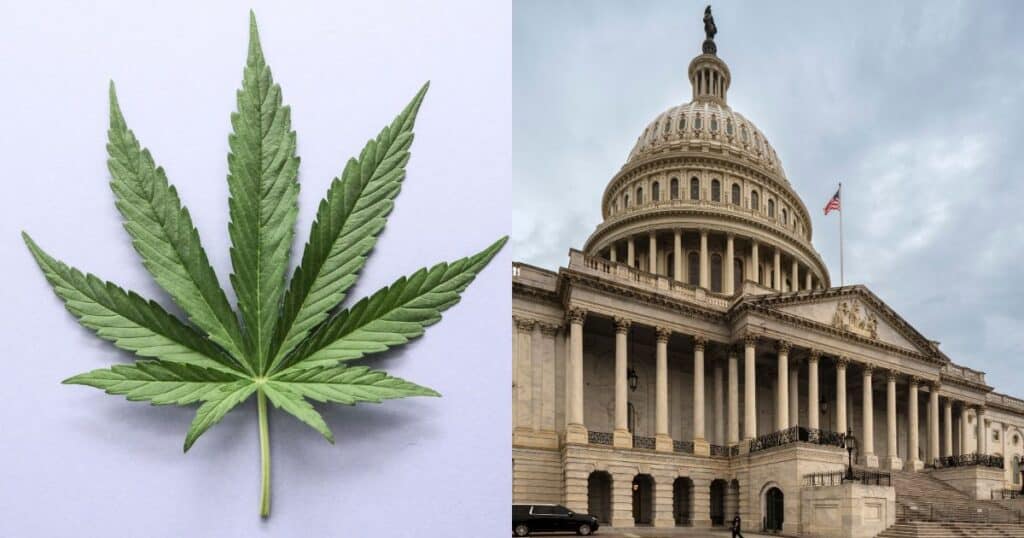Washington D.C – The landscape of cannabis regulation in the United States has been dynamic and complex, especially with the recent move of marijuana rescheduling by the federal government from Schedule I to Schedule III under the Controlled Substances Act (CSA), following recommendations from HHS and, most recently, the DEA.
This is possibly a step forward for patients, but for cannabis businesses, it could potentially open up a Pandora’s box of regulatory and operational challenges. While some see it as a step in the right direction, we argue it’s not the ultimate solution. The ideal path forward is to remove marijuana from the CSA entirely, eliminating many of the potential issues that rescheduling brings.

Implications of Marijuana Rescheduling
The rescheduling of marijuana to Schedule III introduces a new set of regulations that marijuana businesses must navigate. Robert Mikos, LaRoche Family Professor of Law at Vanderbilt University, notes that the impact will be limited because marijuana will still be regulated under the CSA and the Food Drug and Cosmetic Act (FDCA).
“One is that this drug is still going to be regulated under the Controlled Substances Act. And those regulations are going to be really hard for the companies now in the industry to satisfy,” Mikos said via The Hill.
Paul Armentano, deputy director of the National Organization for the Reform of Marijuana Laws, also emphasizes the uncertainties: “The reality is that none of us know, and most likely, these policies and regulations are going to continue to evolve after the fact.”
“We’ve never had a situation where a substance has been moved from schedule one to another schedule of the CSA prior to that substance going through a traditional FDA market approval process and having that substance be approved,” said Armentano.
The unprecedented nature of this rescheduling means businesses are stepping into uncharted territory, facing unpredictable changes in the regulatory landscape.
Tax Relief
One of the most touted benefits of rescheduling marijuana to Schedule III is the potential tax relief. Under the current U.S. tax code 280E, businesses dealing with Schedule I or Schedule II substances cannot make standard tax deductions. Rescheduling to Schedule III would allow cannabis businesses to deduct ordinary business expenses, which could lower operational costs.
Banking and Legal Protections
Another significant challenge is the ongoing issue of banking and federal bankruptcy protection. Currently, federal law considers plant-touching cannabis businesses to be operating illegally, making them ineligible for federal bankruptcy protection.
Rescheduling marijuana to Schedule III does not automatically change this status. While some argue that this move might liberalize bankruptcy courts’ approach to cannabis-related cases, the fundamental issue remains: businesses must be registered with the DEA to legally handle Schedule III substances.
Without this compliance, cannabis businesses continue to operate in a legal gray area, lacking access to crucial financial protections and services.
Unlocking Federal Research Opportunities
One of the most significant benefits of rescheduling marijuana from Schedule I to Schedule III is that it expands federal research opportunities that were previously restricted. As a Schedule I substance, authorities deemed marijuana “too dangerous” for research on human subjects, even under the careful supervision of medical professionals.
The limited supply of marijuana for research purposes further impeded scientific progress. In contrast, Schedule III substances, while still controlled, are subject to fewer restrictions compared to Schedule I substances.
Rescheduling will pave the way for extensive research, offering U.S. scientists the ability to conduct comprehensive studies on the cannabis plant and its interactions with the human body and mind. These advancements in research could jumpstart the development of additional marijuana-based medications, enhancing our understanding and potential therapeutic use of cannabis.
Unanswered Questions and Legislative Complexities of Marijuana Rescheduling
Rescheduling marijuana to Schedule III to Schedule I leaves numerous critical questions unanswered. Unlike other Schedule I substances, marijuana’s unique status sees it legally sold for recreational use in 24 states, a landscape no other Schedule I drug occupies.
This raises substantial uncertainty regarding federal navigation—will the government carve out an exception for cannabis? Given historical precedence and federal policy consistency, such differentiation appears unlikely.
Furthermore, while rescheduling modifies penalties, it does not legalize state-level marijuana programs. The CSA imposes stringent controls on the Production and distribution of Schedule III substances, mandating FDA approval for manufacturing processes and specific uses.
Past FDA approvals of marijuana-based medications, such as Sativex and Marinol, illustrate this point. These approvals are narrow and don’t extend to the broad spectrum of marijuana products available in state-legal markets, such as edibles or raw flower products.
Thus, rescheduling marijuana to Schedule III won’t legitimize state-legal marijuana programs. Instead, it shifts their status to “less illegal,” as Schedule III penalties are less draconian than Schedule I. The state-legal cannabis industry may continue operating in a legal grey area, navigating a precarious balance between federal restrictions and state regulations.
The Case for Complete Removal from the CSA
Simplifying Regulations
Removing marijuana completely from the CSA, which has been proposed since the recommendation of rescheduling, would streamline the regulatory landscape, providing a simpler and more consistent framework for cannabis businesses. This action would eliminate the dual regulatory burden imposed by the CSA and the FDCA, making it easier for businesses to comply with one set of clear, uniform rules.
Full Access to Banking Services
One of the foremost challenges faced by the cannabis industry is the lack of access to standard banking services. Since federal regulations govern most financial institutions, they hesitate to engage with businesses with Schedule I or Schedule III substances.
Removing marijuana from the CSA would grant these businesses federal legitimacy, thereby opening doors to banking services such as checking accounts, loans, and even federal bankruptcy protections. This would place cannabis businesses on an equal footing with other legal industries, allowing for more robust financial operations and stability.
The current patchwork of medical and recreational cannabis state laws results in a fragmented industry with varying degrees of legality and regulation. Complete removal from the CSA would allow for harmonizing state and federal laws, fostering a more cohesive and integrated national market. This alignment would simplify compliance for businesses operating in multiple states and reduce the complexity of navigating state regulations.
Avoiding Extra Regulations and Restrictions
Rescheduling marijuana to Schedule III, though a step in the right direction, will likely introduce extra layers of regulation. Companies would still face stringent controls on production and distribution, which could hinder business operations and innovation.
Additionally, the federal government would likely impose more taxes, adding another financial burden, especially for smaller companies. By contrast, removing marijuana from the CSA entirely would reduce these regulatory and financial pressures, helping smaller businesses to survive and compete effectively against larger Multi-State Operators (MSOs).
Smaller cannabis companies already struggle to compete with the larger MSOs and added regulations from rescheduling could exacerbate this challenge.
Removing marijuana from the CSA would create a more equitable environment, allowing smaller businesses to thrive without facing overwhelming regulatory obstacles and additional tax burdens.
This approach supports a more diverse and competitive marketplace, which ultimately benefits consumers by providing a wider range of products and innovations.

Overall, we here at Beard Bros believe the complete removal of marijuana from the CSA represents the most effective path forward for the cannabis industry. It simplifies regulations, ensures access to banking, harmonizes existing legislation, avoids additional burdensome restrictions, and supports smaller businesses. This approach aligns with the evolving public sentiment and acknowledges cannabis as a legitimate industry poised for growth and innovation.

















